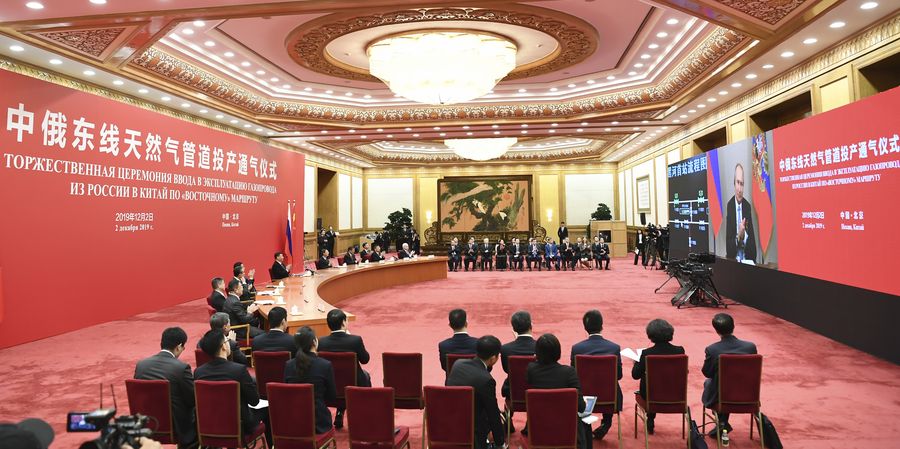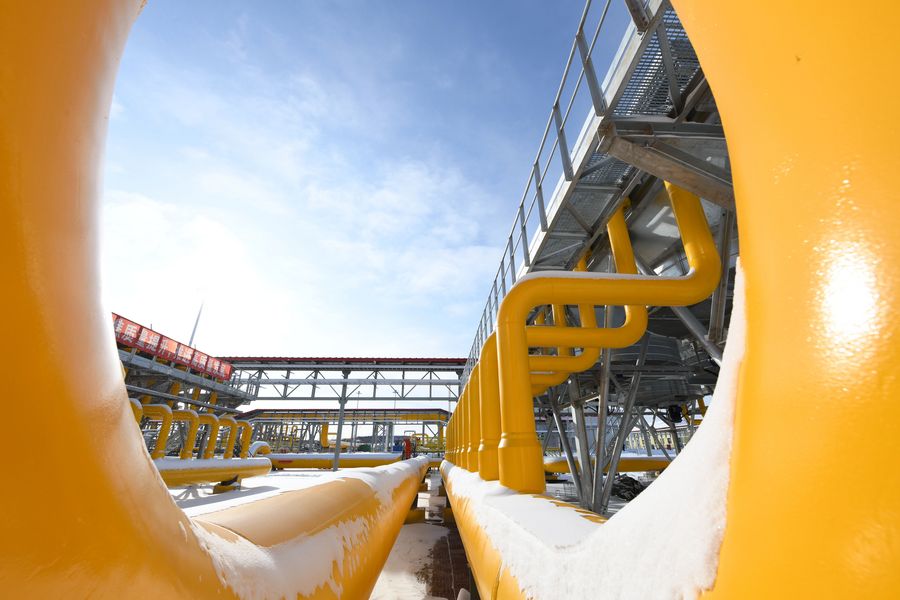China-Russia east-route natural gas pipeline operational
 0 Comment(s)
0 Comment(s) Print
Print E-mail Xinhua, 12 03, 2019
E-mail Xinhua, 12 03, 2019
As a landmark project of China-Russia energy cooperation, the China-Russia east-route natural gas pipeline went into operation Monday, a successful example of China's practice of the concept of "mutual benefit and win-win" in international cooperation.
HARBIN, Dec. 2 (Xinhua) -- The China-Russia east-route natural gas pipeline became operational Monday, marking the start of a new era in the two countries' energy cooperation.
"East-route natural gas pipeline is a landmark project of China-Russia energy cooperation and a paradigm of deep convergence of both countries' interests and win-win cooperation," Chinese President Xi Jinping told his Russian counterpart Vladimir Putin via a video call in Beijing Monday afternoon, as the two heads of state jointly witnessed the launching ceremony of the pipeline.
Xi congratulated the launch of the pipeline and expressed appreciation to the construction teams from both countries.

Chinese President Xi Jinping has a video call with his Russian counterpart Vladimir Putin, as the two heads of state jointly witness the launching ceremony of the China-Russia east-route natural gas pipeline, in Beijing, capital of China, Dec. 2, 2019. (Xinhua/Xie Huanchi)
The pipeline is scheduled to provide China with 5 billion cubic meters of Russian gas in 2020 and the amount is expected to increase to 38 billion cubic meters annually from 2024, under a 30-year contract worth 400 billion U.S. dollars signed between the China National Petroleum Corp (CNPC) and Russian gas giant Gazprom in May 2014.
The cross-border gas pipeline has a 3,000-km section in Russia and a 5,111-km stretch in China.
The pipeline uses strong and tough X80 pipeline steel, with a super large diameter of 1,422 mm and 12 MPa high pressure, said Wang Yilin, board chairperson of CNPC.
Construction work on the Chinese part of the east-route pipeline began in June 2015. Entering China via the border city of Heihe and running through nine provinces, municipalities and autonomous region, the pipeline has also been connected with existing natural gas networks in China to allow the Russian natural gas supply to reach China's northeast, Beijing-Tianjin-Hebei and the Yangtze River Delta regions.
On Monday, at the gas-distributing and compressing station in Heihe, northeast China's Heilongjiang Province, the data screen was switched on, indicating parameter variations of the gas passage.

A staff member walks past pipelines in a section of the China-Russia east-route natural gas pipeline in Heihe, northeast China's Heilongjiang Province, Nov. 19, 2019. (Xinhua/Wang Jianwei)
Shao Hua, general manager of Heihe City Natural Gas Development Co., Ltd. of China Gas, said that Heihe still largely relies on coal for heat. With the pipeline's operation, the city now has access to a stable supply of clean energy.
Heihe has registered 30,000 households for switching to natural gas for heating. It will take one year to complete full coverage of the gas network in the city, according to the company.
China's apparent natural gas consumption reached 280.3 billion cubic meters in 2018. The country's demand for natural gas will continue to soar toward 2040, outstripping domestic output by around 43 percent, according to an International Energy Agency report.
China aims to raise the use of natural gas to 10 percent of the country's energy mix by 2020 and 15 percent by 2030, according to the National Development and Reform Commission.

Photo taken on Nov. 19, 2019 shows a section of the China-Russia east-route natural gas pipeline in Heihe, northeast China's Heilongjiang Province. (Xinhua/Wang Jianwei)
Sun Xingxiang, deputy chief economist of China Petroleum Pipeline Engineering Co., Ltd. under CNPC, said the operation of the China-Russia east-route gas pipeline can help reduce the annual emissions of carbon dioxide, sulfur dioxide, nitrogen oxides and dust by 164 million tonnes, 1.82 million tonnes, 460,000 tonnes and 840,000 tonnes, respectively.
"This will effectively optimize the country's energy consumption structure, mitigate air pollution along the route and keep our skies blue," Sun said.
The project is a successful example of China's practice of the concept of "mutual benefit and win-win" in international cooperation, and it combines the advantages of Russia's abundant resources and China's vast market, said Ma Youjun, an expert with the Heilongjiang Provincial Academy of Social Sciences.
It will also boost the development of Russia's Far East, according to Ma. Enditem
(Reporting by Fang Ning, Qiang Lijing, Wang Jian, Wang Chunyu, Fan Yingchun, Jiang Hexuan, Cheng Lu, Bai Jie and Pan Jie)
(Video reporters: Qi Hongxin, Ren Jun, Zhang Ruoxuan; Video editor: Yin Le)■


